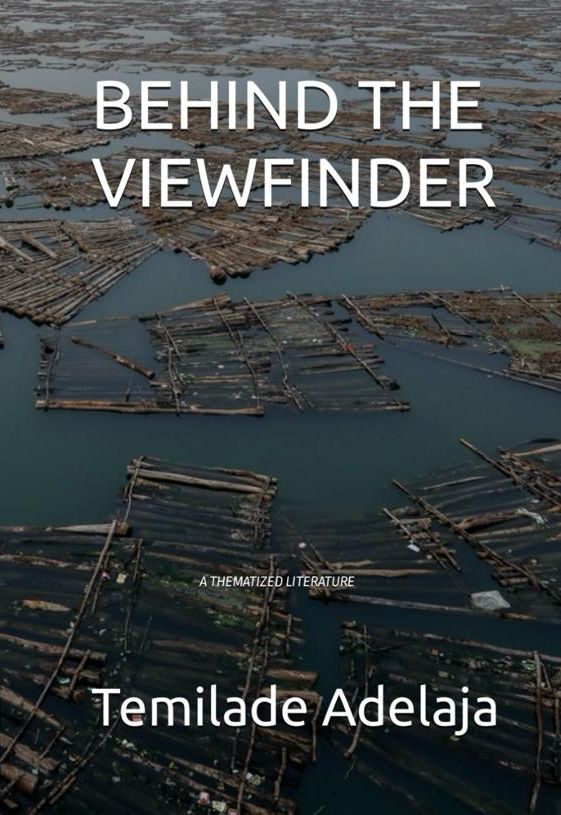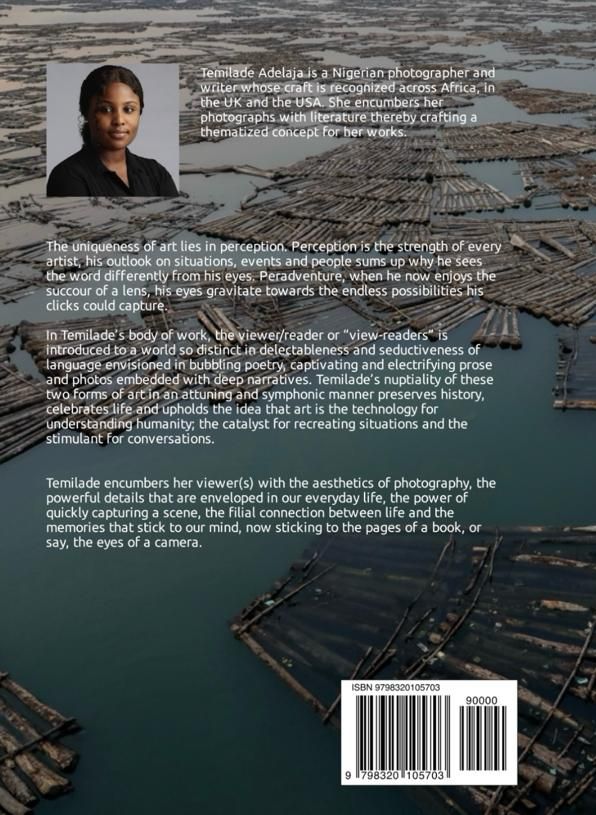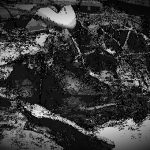
BEHIND THE VIEWFINDER: A REVIEW
Temilade Adelaja’s picto-literal inclination via her poetry collection titled “Behind the Viewfinder” is an aesthetic testament to the hybrid nature of art. Rendered in simple diction, the poet navigates through life – from the personal to the impersonal, private to the public. The thematic preoccupations of the poems, solidified by the captivating lenses of the poet, drive home numerous messages. The shifting setting between Lagos – Ahoada – Enugu offers a captivating exploration of life, culture, and human experiences through a unique fusion of poetry and travel photography. Adelaja’s work exemplifies the beauty and power of hybrid art forms, where words and images intertwine to create a rich tapestry of storytelling.
What I find most intriguing is Adelaja’s ability to evoke a sense of place and atmosphere through her poetry. Each poem serves as a window into a different corner of the world, whether it’s the bustling streets of Lagos, the tranquil waters of Makoko, or the vibrant markets of Mile 12. Through her descriptive language and keen observations, Adelaja brings these settings to life, inviting readers to immerse themselves in the sights, sounds, and textures of each location; the distinct tapestries of our society aren’t left out as well as a subtle jab to the ever-loving and caring Nigerian Government.
The long cry for justice that seemingly falls on deaf ears is portrayed by poems such as “Chibok Girls Beneath the Bridge,” “The Liar of the People,” and “Political Procession”. This mirrors the plight of Nigerians at the receiving end of sweet-coated gambits from the ruling class, who get into power only to quench the false rays of hope earlier implanted upon the minds of these gullible masses. However, Nigerians are resilient people who can go to any length to seek justice “Amidst the charged atmosphere, I witnessed a powerful moment: a man baring his back while someone painted a message, symbolizing the collective call for freedom. The air echoed with chants of “End SARS!” as the crowd’s energy soared.”
“Enugu mother,” “Graceful contortions,” “Lofty aspiration,” “Casting the net,” and “Rising waters” amongst others, vividly extol the virtues of sacrifice, dedication and perseverance entrenched in mankind. Often overlooked, her curious lenses capture moments matching these priceless qualities such as the picture of the female contortionist whose flexibility underscores years of practice and discipline. Perhaps, it is necessary to note that mothers aren’t the only ones making sacrifices to ensure the growth of their wards, the men do even more because “Each morning, as the sun peeked over the horizon, Azeez set out on his weathered boat, equipped only with his fishing net and a heart full of hope. Some days, the ocean rewarded him with a plentiful catch, while others left him empty-handed. Yet, through the highs and lows, Azeez persevered, driven by his son’s educational aspirations.”
Regardless, the women are given their flowers too. “With each step, she moves with determination, her posture upright and confident despite the challenges she may face. The weight of the bag on her head is a testament to her industrious spirit, carrying the fruits of her labour or provisions for her family with grace and poise.

”The intricacies of life aren’t exempted as poems like “Game of Kings,” “Streetball Symphony,” “Market Inferno,” and “Siesta in Makoko” solidify the presence of challenges in life, adaptation and finding happiness in any situation, the ephemerality of life, as well as wisdom needed to navigate these obstacles is likened to the game of chess. Most especially in “My House is a Boat,” a home transcends the mere brick structure, as pictorially we see a house engulfed by flood, making us realize that what truly makes it a home isn’t the physical structure but the relationship existing between the family members, further validates love as one of the greatest virtues that equip a unit with the strength to overcome any challenge no matter how daunting.
“Once stood proud walls and floors, now embraced by the tide,
As nature weeps, a melancholic guide.
Yet within these watery walls, tales abide,
Of laughter and love, in memories that reside.”
The pleasant arms of unity aren’t left out as her nib dances through “Market places: Red pulps” from the enclaves of the poet’s memories to share how priceless unity is and how real strength lies in it should we choose to embrace it. “I witnessed an encounter between a tax collector, locally known as Agberos, and a defiant trader refusing to pay his demands. In a heated exchange, the collector, fueled by frustration, violently yanked the trader’s basket of tomatoes, spilling its contents onto the ground… As the trader bravely called for help, the market’s leader, Iya Alaje, intervened, rallying other women to confront the tax collector. What ensued was a chaotic and violent confrontation, but it sent a clear message.” A sharp contrast to what our nation encounters today as our unity is torn apart by tribalism, amongst others. Imagine what would happen if every Nigerian embraced it.
The aesthetic plumes of nature aren’t left out as her lenses capture wonderful moments in nature ranging from two siblings on a canoe in the poem “Siblings on Canoe,” the metaphoric nexus between the onion vegetable and her favourite melody in “Cry me a river” as well as the beautiful sunset in Lagos which one’s eyes can’t eat enough of in the poem “Tranquil twilight.” There couldn’t have been a better quatrain to accompany the beautiful photograph of the sun’s dive into the horizon upon the face of the waters.
“Upon the lagoon’s tranquil embrace,
Where the sun bids its last embrace,
Logs rest upon the water’s calm,
As the day succumbs to evening’s charm.”
The environmental injustice meted out to nature isn’t ignored as the poet registers her displeasure regarding poor maintenance habits and absence of discipline about how we treat nature in “The Beach’s Cry.” Her lens presents a dilapidated beach house adorned with plastic waste and one can’t help but perceive the stench of decay from the image. “Surrounding the forsaken edifice, plastic wastes litter the sandy shore, a stark reminder of humanity’s impact on the environment. Discarded bottles, bags, and debris mar the pristine beauty of the coastline, casting a shadow over the idyllic scene.”
“Palm Sunday reverence” and “Palm Sunday procession” present religion as an enduring ritual, perhaps her admiration of this religious ritual for over two thousand years makes it even more fascinating. The image of members of the Celestial Church of Christ marching through the road in celebration of Palm Sunday certainly underscores the endurance of faith and its intersectionality with modernity.
Memory and its nostalgic aroma are vividly captured in the poem “Melodies of Memories.” The image of a man holding a radio close to his ears graces our eyes as the “echoes of a bygone era” fill his ears. The plume of nostalgia is one that all humans can resonate with. Once in a while, we find ourselves transported to the enclave of memories either on the wings of music or pictures.
In today’s artistic landscape, the blending of different mediums is becoming increasingly prevalent, offering audiences a multi-dimensional experience that engages the senses and emotions on multiple levels. The accompanying images serve as visual anchors, providing a tangible connection to the places and people depicted in the poems. By pairing her words with photographs, Adelaja enhances the storytelling experience, allowing readers to not only imagine the scenes described but also see them come to life before their eyes. Moreover, Adelaja’s work serves as a testament to the power of thematized literature, where art and storytelling intersect to create a cohesive narrative.
Ultimately, Behind the Viewfinder is a testament to the beauty and complexity of the world we inhabit, as seen through the lens of a poet and photographer.
About the Author
Iwuagwu Ikechukwu is a poet, essayist, screenwriter, playwright and translator. Some of his reviews, poems and short stories have appeared in several literary magazines worldwide, both online and in print. He received an honourable mention in the IHRAF Creators of Justice award in New York – 2020 edition. He was also shortlisted for the 2022 Alpine Fellowship Visual Arts Prize in London, UK as well as the ANTOA essay prize in Africa. When he is not writing, he can be found researching, teaching or reading the works of Christopher Okigbo, Isidore Diala, Soyinka, Adichie, Buchi Emecheta & Ifesinachi Nwadike. His publications The Baptism (A Collection of Three Short Stories), After Dusk Comes Dawn, See History & Shakespeare Speaks Pidgin are all available on Amazon.




Average Rating